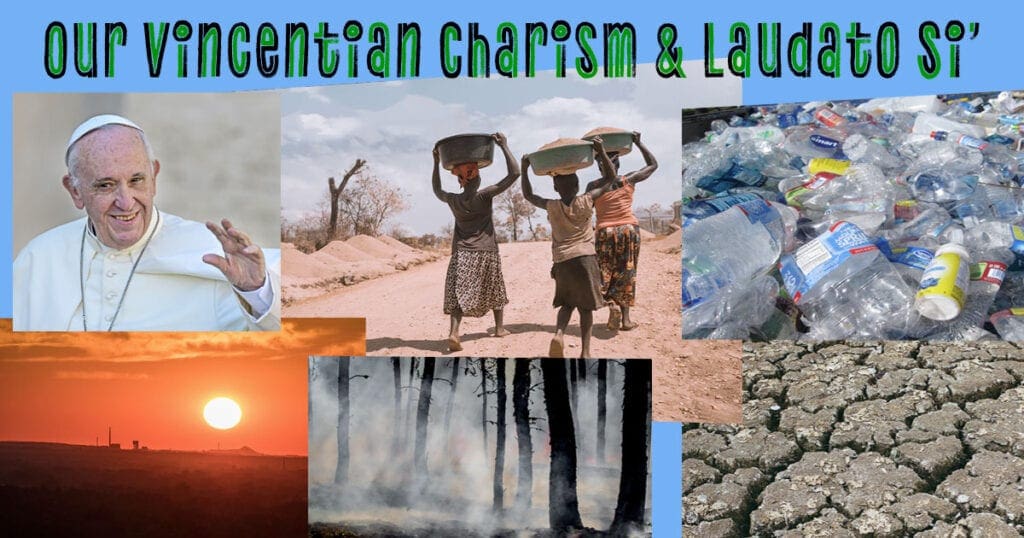“…[O]ur planet is a homeland and that humanity is one people living in a common home. An interdependent world … motivates us to ensure that solutions are proposed from a global perspective, and not simply to defend the interests of a few countries. Interdependence obliges us to think of one world with a common plan.” – Laudato Si, Chapter 5

Pope Francis’ second encyclical, the 2015 Laudato si’, calls us to action before it even begins. Its subtitle, “on care for our common home,” positions us to think of our responsibility for environmental and developmental stewardship not as an external campaign, but as a kind of housekeeping: the planet is not merely an environment we exist in; it is our home. We are raised on its mountains and valleys, on its waters and its shores. We plant our roots in its dirt.
The Laudato si’ is a text which is deeply concerned with roots. Pope Francis writes with dismay about the “ethical and spiritual roots of … problems, which require that we look for solutions not only in technology but in a change of humanity; otherwise we would be dealing merely with symptoms.” He urges us to take urgent action which addresses not outputs but inputs: to solve problems we cannot simply ask, “What has happened?” but also, “Why has this happened, and how can we change it?” These are difficult questions with complex answers, but the Laudato si’ is an optimistic text. That an issue is complex does not mean it is irresolvable, and the encyclical is less a condemnation than a call to action.
Homelessness is a complex problem, affecting society’s most vulnerable, with deep, intersecting roots: unemployment and underemployment; discrimination against certain races, ethnicities, genders, and sexualities; relationship violence; physical and mental health; addiction; and, as Pope Francis notes, environmental degradation as “changes in climate … affects the livelihood of the poor, who are then forced to leave their homes, with great uncertainty for their future and that of their children.” And while it is a problem which can be solved, doing so requires us to look not only at housing those already on the street, but also at addressing the root reasons that people become homeless in the first place.
This is a key part of the work of Institute for Global Homelessness (IGH). We take a global view but a local approach, operating at the city level to understand not only how many people are homeless, but who, why, and how to move them into housing that they are able to sustain. IGH helps cities understand what the pathways to homelessness are, including climate change, harmful development practices, and social exclusion. This work is not done by impressing Western norms and ideas onto cities, but by lifting up and supporting local knowledge: as Pope Francis writes, “as life and the world as dynamic realities, so our care of the world must also be flexible and dynamic.” IGH cities are asked to approach homelessness work through partnership with people of lived experience and with respect for all cultural understandings of what makes a “home.”
We know what the roots of homelessness are, and how they connect to other systems in a complex web. But: complexity does not make an issue impossible to resolve, and homelessness can—must—be solved if we are to move into a sustainable world where all humans enjoy “a right to life and happiness … endowed with unique dignity.”
Molly Seeley,
Special Projects Manager
Institute of Global Homelessness
The Vincentian Charism and Laudato Si’ is our effort to share various ways that Vincentians find their charism connects with Laudato Si’. We encourage your comments on these posts and welcome anyone interested in submitting an article to email Jim Paddon at jpssvp@hotmail.ca.







Great article as our the others in this series. I am appreciative that we are connecting Laudato Si’ from a Vincentian perspective.
Molly, thank you once again for your excellent three part article in this series which gives such a good overview of what IGH is doing as well as the complexity of roots of homelessness and ways we as a Vincentian family are working to end it. We are living Laudato Si’. I want to give a shout-out to my Congregation rooted in the Charism of Charity which means both systemic change as well as direct service – love as affective and effective. I think of LEFSA, Sisters of Charity Housing Development Corporation and St. Joseph’s Medical Center in Yonkers – all who are meeting the needs of so many vulnerable people. I thank and pray with and for all the staff who keep moving forward amidst the complexity of laws, regulations, systems. They work tirelessly, perseveringly and creatively to seek ways to end homelessness while bringing dignity, respect and compassion to those they serve.